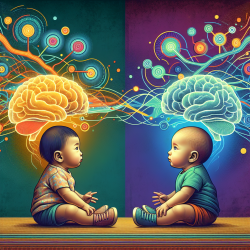Imagine the brain as a bustling airport, with planes constantly landing and taking off. Each plane represents a thought, a task, or an action that needs to be managed efficiently. This intricate system of control is akin to what scientists refer to as executive function and self-regulation—skills that are critical for life and learning.
Understanding Executive Function
Executive function encompasses three key brain functions: working memory, mental flexibility, and self-control. These skills allow individuals to hold onto and work with information, focus on tasks, filter distractions, and switch between activities seamlessly. While children aren't born with these abilities fully developed, they have the potential to cultivate them over time.
The development of executive function skills begins shortly after birth and continues through adolescence into early adulthood. It's crucial to understand how interactions and experiences shape these skills.
The Lifelong Benefits of Executive Function Skills
- School Achievement: Children with strong executive function skills can follow multi-step instructions, resist distractions, manage long-term projects, and adapt to changing rules. This leads to better educational outcomes and a population better equipped for the challenges of the 21st century.
- Positive Behaviors: These skills foster teamwork, leadership, decision-making, adaptability, and emotional awareness. Societal benefits include more stable communities and reduced crime rates.
- Good Health: Individuals with strong executive function skills make healthier lifestyle choices and are better equipped to handle stress. This results in a healthier population and reduced healthcare costs.
- Successful Work: Strong executive function enhances organizational abilities and problem-solving skills, leading to economic success and a more innovative workforce.
The Role of Relationships in Skill Development
The development of executive function skills is deeply rooted in relationships. From family members to educators and peers, the support system around a child plays a critical role. Key factors include:
- Supportive Adults: Adults who model these skills and provide consistent support help children develop effectively.
- A Safe Environment: Protecting children from chaos and adversity is essential for fostering executive function development.
The Importance of Activities and Environment
The activities children engage in and their environments significantly influence skill development. Essential strategies include:
- Diverse Experiences: Activities that promote emotional, social, cognitive, and physical development are crucial.
- Coping with Stress: Teaching children to manage stress with the help of supportive adults is vital.
A safe environment where children can explore creativity and exercise is equally important. Economic stability reduces anxiety and supports healthy development.
The Policy Implications
The importance of supporting the development of executive function skills extends beyond individual benefits; it has significant policy implications:
- Early Care Programs: Integrating executive function development into early education can enhance outcomes significantly.
- Caretaker Training: Providing training for caregivers ensures they can support children's skill development effectively.
The evidence is clear: developing executive function skills is not only beneficial but essential for both individual success and societal progress. For more information on this topic, please follow this link.










